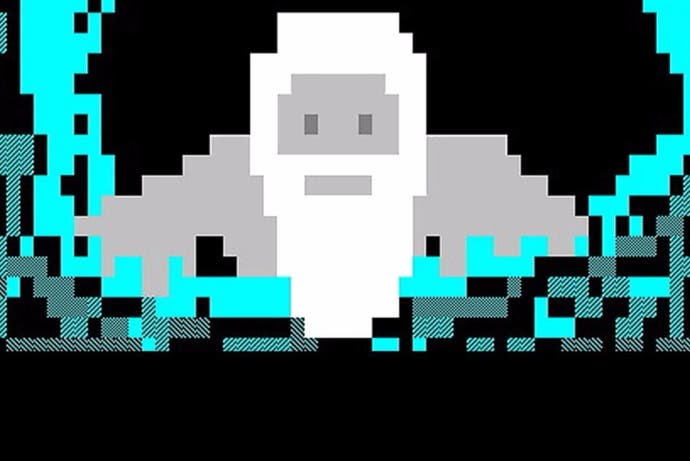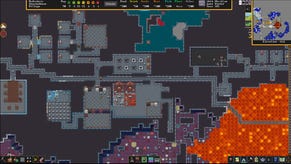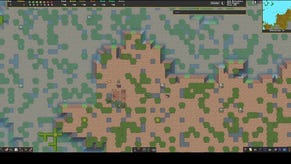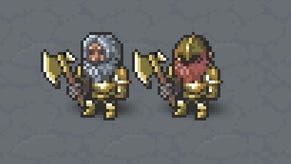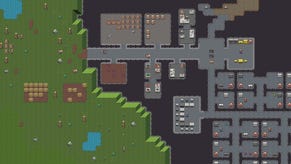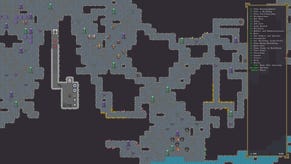Learning to love Dwarf Fortress, gaming's deepest simulation
It's the pits.
When it comes to 4X, the first two x are the best x, aren't they? The peeling away of mystery, the bringing of light to the world - rolling back the fog of war to expose terrain, neighbours and sweet, sweet resources. Adventure, discovery, the era of Magellan rather than Cortes: this is what drives me to the genre again and again. It's why I've started thousands more games of Civilisation than I've ever finished, why so many games of Endless Legend are left to digitally moulder: I am a scout, not an administrator, a Lewis and Clark, rather than Pricewaterhouse Cooper. The fine print exhausts me.
But...Dwarf Fortress. A game of almost pure administration. A game of such Byzantine complexity that, after ten years of incremental releases and updates, the number of people who really, completely understand it is negligible. A game which is definitely 4X, but in which the last X is impossible. There is no win condition, no end game - the only way out is through death or abandonment. A game in which it's all you can do to try and fly as high as you can before your wings catch fire and the death spiral takes hold. A game I have played obsessively for nearly a decade and am still terrible at.
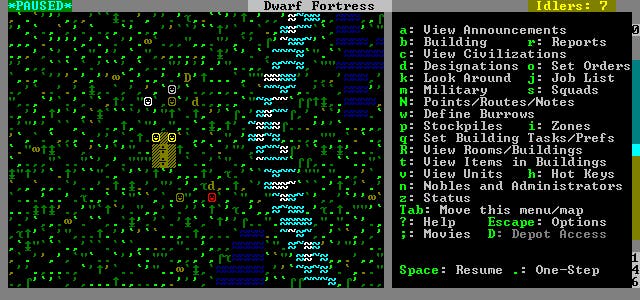
I love it. Dwarf Fortress is ugly and hard and broken and unfair and I honestly think it might be one of the most important games ever made.
Perhaps I am ahead of myself. Let's roll it back a bit.
What is Dwarf Fortress?
Dwarf Fortress is essentially a game about making a house for some dwarfs. (At least in the game's main mode, but more on that later). It's completely free, relying on voluntary donations for all monetisation, and has been since the first alpha was released in 2006. It's also built almost in its entirety by one person: Tarn Adams, with his brother Zach pitching in occasionally. The current version of the game, 0.43.05, is so named because Adams sees it as 43 per cent complete - not even half way through the ever growing list of 2600 features he's adding. It's very much a magnum opus.
At its heart, DF is a management sim with a rogue-like twist. Taking control of a small expedition of dwarfs (seven, naturally), the player picks a spot, packs their kit and sets out to dig a hole containing maximum gold and minimum hideous monsters. They build an economy, repel invaders, trade with locals. It's just like Sim-City, or Theme Hospital or XCOM or Dungeon Keeper, or Civ. Except it's like all of them. In one game. With a UI made for calculators by cold-war era NASA.
Everything in DF is absurdly over complicated, which is exactly why people love it. Starting a game goes like this.
- Set up the parameters for world generation
- Generate the world
Annnnnnnddddd, let's just pause there a moment.
Parameters are pretty easy. Set a planet's age, climate, topography, its mineral richness, how stabby it's likely to be. All the notes God made on the back of a phone bill on the morning of day one.
Then, we generate the world. What a phrase. So easy, so throwaway. Just another click in a menu on the way to some silly entertainment. A bunch of boring old algorithms pottering away behind the scenes, deciding where to put the trees. Everyone loves a bit of procedural generation, don't they? Keeps things fresh.
Except, like nearly everything it does, DF's world generation is incredible - and not least because of the absurd redundancy of its depth. Lots of games do procedural geography, a few do some procedural geology. Fewer still attempt procedural meteorology. Dwarf Fortress does all that, in spades. Then it starts adding people, and creation myths and biomes and a billion other things that you'll probably never even notice because you'll be too busy trying not to boil to death in magma or be eaten by giant carp.
This is a game which calculates the volume of blood in every creature it generates so it knows how much alcohol it would have to consume to get drunk, an update which, remarkably, ended up covering people's fortresses in cat vomit.
So you hit that little button, a big-bang finger press. Cultures rise and fall, heroes are born and slain. Forgotten Beasts, unique terrors of subterranean nightmare, are spawned and set free. Heroes meet monsters, and sometimes even prevail. Strongholds are swarmed and overcome, others rise to prosperity and power as wars and alliances are slung through binary aeons with staccato glory. Legends form and about them plays are written, great books penned, songs sung to carry epics through the ages. When DF says it's 'generating a world', it means it's 'Generating a World'. It's beautiful, insane overkill.
Just last year, as part of his endless cycle of creation, arch-tinkerer Adams put together the system which generates creation myths, giving a talk on it during the first day of GDC in 2016. In that short presentation he casually fired off tens of these processes of cultural geneses with single button presses, creating extensive and often contradictory religions for several races at a time. He could make a lot of money as a cult leader if Dwarf Fortress ever dries up.
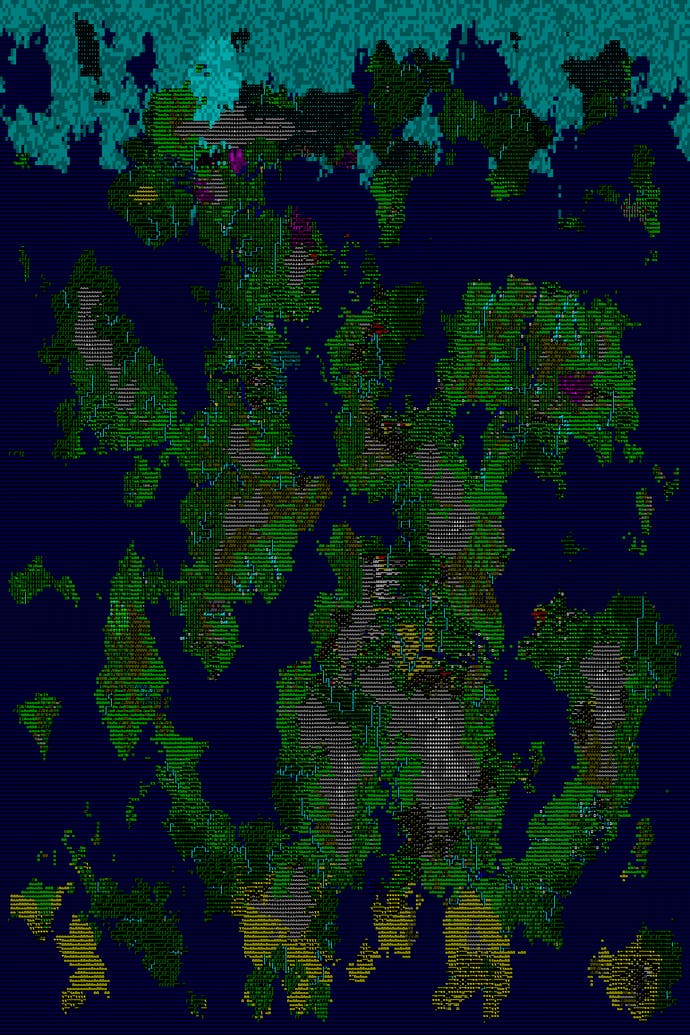
When your incredible world is baked, geographically, anthropologically, culturally, you'll be faced with a map. Except it doesn't look like a map. It looks like Neo just threw up on Geocities. Everything in Dwarf Fortress is ASCII based - made up of fonts rather than sprites or models - and the world map is no exception.
So, you look at the world for a while, and eventually you start to distinguish mountains from trees, tundra from desert. Those there are settlements, that thing a road. There are tiny beaches, meandering delta and ominous purple spires. And it's vast.
Depending on what criteria you picked pre-bake, you'll be looking at a roughly planet sized environment with its own intricate history of wars and religions, cultural domains and racial borders. The world is very much your oyster, so where do you start?
Let's get back to the list.
- Set up the parameters for world generation
- Generate the world
- Embark
Embarking
Embarking. Simple. Pack a picnic, put your dwarfs on a burro, head out to a nice mountain and settle down.
But no. Never simple.
You can't go anywhere until you know where you're going. So you can browse the world manually, tap-tap-tapping a cursor around looking for a nice spot without too many locals, or you can pick a few parameters, such as whether there's sand there for glass-making or clay for pottery. You can pick vegetation and tree density (in terms of coverage in this case, but actually each of the dozens of different types of wood has its own specific material density, sourced wherever possible from actual timber). Like a Trip Advisor for outdoorsmen.
Then you'll need to deal with the HR side of things. (DR?) This means giving your dwarfs skills, choosing from a roster which ranges from essential (mining) to the less essential (music), a list of dozens. This is where you decide what you want to do first when you arrive at the site of your new city, as you'll be waiting a while before the first migrant caravan brings new blood and new talents. You'll probably want a carpenter, for example, and a fisherdwarf or a hunter. Someone needs to run the numbers and keep track of stocks, so you'll want somebody who's good at organising. And, as they're going to be a bean counter, you may as well give them a few points in negotiation and appraisal too, so they can deal with merchants. A brewer is essential, obviously, because dwarfs quickly get uppity without the requisite amount of alcohol, so you'll also need farmers to grow and gather things to ferment. Then you need to start thinking about architectural skills and crafts like leatherwork or smithing.
A fairly typical group might look a little something like this as they trot off into the wilderness. (Courtesy of Reddit User Viscis.)
- Miner: Adequate Miner
- Woodworker: Novice Carpenter, Bowyer
- Woodcutter: Novice Wood Cutter, Brewer, Cook, Grower, Herbalist, Furnace Operator, Wood Burner, Lye Maker, Potash Maker
- Stoneworker: Novice Engraver, Mason, Mechanic, Building Designer
- Jeweler: Novice Gem Cutter, Gem Setter, Wood Crafter, Stone Crafter, and Bone Crafter
- Fisherdwarf: Novice Fisherdwarf
- Fish Cleaner: Novice Fish Cleaner, Butcher, Tanner, Weaver, Clothier, and Leatherworker
If you follow that link you'll find that, like everything in Dwarf Fortress, the best starting skills are very much a matter of debate. But let's assume you've picked your squad. Now, they'll need equipment, food and lots of booze, but bear in mind that 'food' can mean anything from giant badger brain to plump helmet mushrooms or raspberries. But this bit is actually pretty easy: take something to dig with, something to cut wood with and a dipsomaniacal picnic and you're pretty much set. You'll probably want a couple of dogs and cats, too, maybe some chickens if you're feeling flush, but essentially seven tiny drunken psychopaths, a donkey, some tools and a lust for glory. We're getting there!
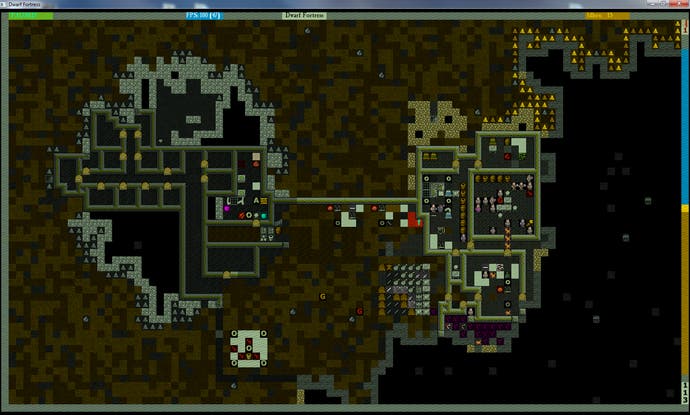
Of course, we haven't actually started the game yet, and we haven't even mentioned the fact that Fortress Mode is just one of three in the game (Tarn Adams originally conceived of the game as a fantasy realm simulator, and Adventure mode lets you wander the entire map as a single, inconceivably vast roguelike). If you want to know how to do that bit, you're going to need a lot more patience than it's taken you to get this far, but I implore you to at least try. If you manage to break the crusty skin and reach that sweet, sweet strategy/simulation custard in the centre, you're going to find a game which can keep you busy for a decade or more.
